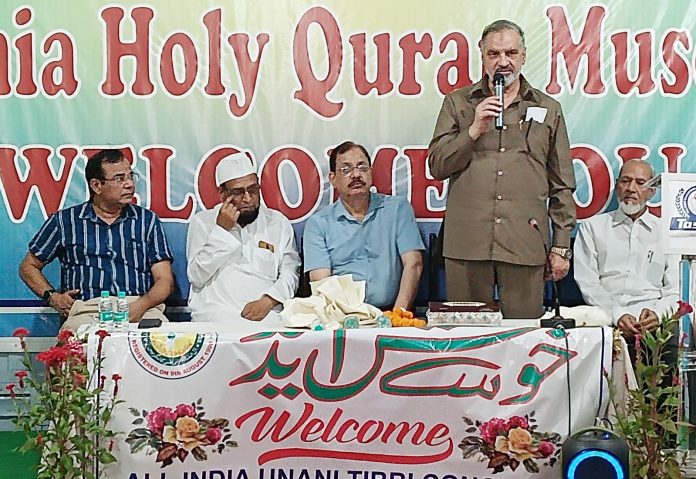Dehradun, July 1: The National General Body Meeting of the All India Unani Tibbi Congress (AIUTC) was held under the chairmanship of Prof. Syed Mohammad Arif Zaidi (former Dean of the Unani Faculty at Jamia Hamdard) at the Tasmia Quran Academy in Dehradun. Prof. Zaidi expressed his astonishment over the government’s lack of interest, which has resulted in the seven-year delay in the construction of the approved Government Unani Medical College in Kaliyar Sharif. He stated that this delay is a significant obstacle to the promotion of Unani medicine in Uttarakhand.
Prof. Arif Zaidi further emphasized that the practice of surgery is declining among practitioners, despite its importance being equivalent to that in allopathy. He also pointed out that Hijama (cupping therapy) is highly valued in Unani medicine but warned against its misrepresentation as a religious practice, stressing its scientific basis. He underscored the importance of ensuring the quality of medicines to strengthen and promote Unani medicine.
Dr. Syed Farooq, the organization’s Patron, shared valuable advice with the practitioners. He asserted that the All India Unani Tibbi Congress is the largest movement for the promotion of Unani medicine. He urged the continuation of this effort and the need to communicate effectively with the government. He recalled a speech by the late former Prime Minister Atal Bihari Vajpayee at Vigyan Bhavan, New Delhi, where Vajpayee praised a Unani practitioner for curing his stomach ailment, highlighting the encouragement this gave to Unani practitioners.
Prof. Mohammad Yunus stated that Unani treatment aligns perfectly with human nature and is a source of complete healing. He urged practitioners to rise above inferiority complexes and materialistic mindsets, focusing instead on serving the public. He lamented that commercial thinking has eroded ethics, while Unani medicine prioritizes ethical responsibilities. He noted the growing popularity of regimental therapy (Ilaj bil Tadbeer) but stressed the need to promote it within scientific boundaries. He highlighted that regimental therapy’s primary advantage is reducing medication intake and promoting better health. He urged educational institutions to give due importance to regimental therapy in their hospital practices.
Dr. Syed Ahmed Khan presented the provincial report, expressing regret over the poor state of Unani medicine in West Bengal, Uttarakhand, Himachal Pradesh, Punjab, Gujarat, Haryana, Assam, and Odisha. Provincial presidents and general secretaries, including Dr. S.M. Yaqoob, Dr. Motiullah Majeed, Dr. Tayyab Anjum, Dr. Mohammad Arshad Ghyas, Dr. Abdul Majeed Qasmi Alig, and Dr. Shakeel Ahmed Meerathi, also shared their thoughts.
Notable attendees included Dr. Ghyasuddin Siddiqui, Dr. Athar Mahmood, Dr. Mirza Asif Baig, Dr. Ehsan Ahmed Siddiqui, Dr. Ahmed Rana, Hakim Kashif Siddiqui, Dr. Mohammad Waseem, Dr. Ahmedullah, Dr. Sufyan, Dr. Saleem Salmani, Dr. Wahajuddin, Dr. Raj Kumar, Hakim Rashadul Islam, Hakim Mohammad Allah Gangohi, Hakim Naeem Raza, Hakim Abdul Rahman, Israr Ahmed Ujjaini, Mufti Wasiullah Qasmi, Hakim Aftab Alam, Hakim Mohammad Asif, Mohammad Hafizur Rahman, and Mohammad Imran Kannauji.
The meeting began with a Quran recitation by Qari Mohammad Yunus Qasmi. The proceedings were conducted by Tahseen Ali Asarvi, and a vote of thanks was given by Dr. Motiullah Majeed (President, All India Unani Tibbi Congress Uttarakhand).




